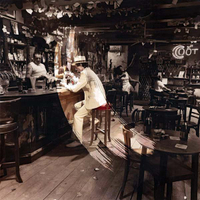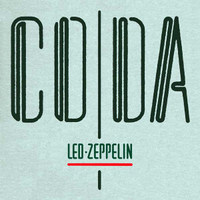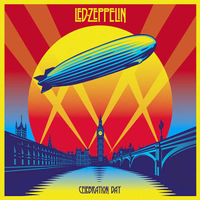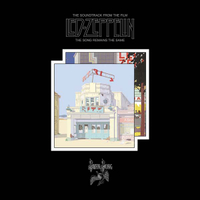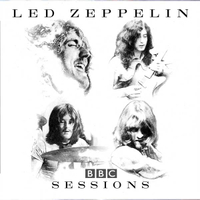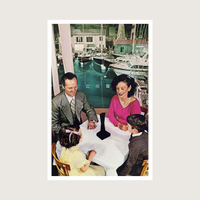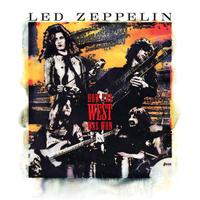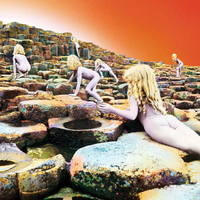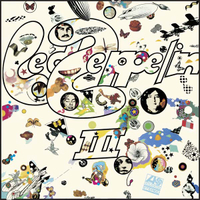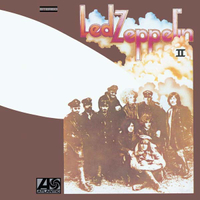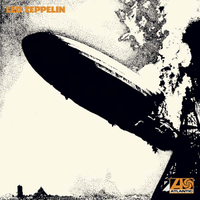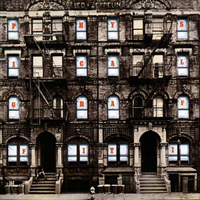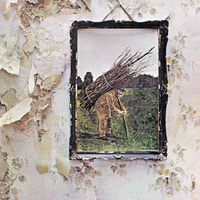"Wrapping blues tradition in boundary-breaking innovation": Every Led Zeppelin album ranked from worst to best
From anonymous sixties session men to globe-straddling seventies rock goliaths - the albums that soundtracked Led Zeppelin's conquest of Earth

The Becoming Led Zeppelin documentary has been criticised by some for its swift, wait-a-sec-what-happened-next conclusion, but there's good reason for that. Ending as Led Zeppelin II is released, the timeline spares the filmmakers the onerous task of having to address the band's Hammer Of The Gods years and all that entails, allowing them to focus on the music, which, as anyone who's seen the film on a big screen can attest, sounds like it was beamed down from Olympus. And that's why we're here.
Jimmy Page, Robert Plant, John Paul Jones and John Bonham formed Led Zeppelin in 1968, taking their name from a prediction from Keith Moon that their band was almost certain to go down like a ‘lead balloon’. Their manager Peter Grant’s lack of confidence in the record-buying public’s pronunciation skills, allied to an innate instinct to think big, translated The Loon’s withering sarcasm into ‘Led Zeppelin’. And before you could say ‘swiftly signed to Atlantic, relentlessly toured’, they were the World’s Biggest Band that, for some reason, nobody you knew had ever seen on television.
Inexplicable anonymity aside, Zeppelin’s vastness was preposterous, and as their fame ballooned, their artistic vision expanded to match. Ever more epic live shows were marked by extensive improvisations by four virtuosi whose inspired ensemble interplay seemed almost supernatural in origin. Audiences broke records, albums camped out at the top of charts and during their 12-year existence, Led Zeppelin casually conquered Earth.
You’ve clearly got all of the Led Zeppelin albums already, so here’s the order in which they appear if you rank them from least-best to most-best.

13. In Through The Out Door (Swan Song, 1978)
By now, the game's all but up. Bonham and Page both face substance abuse issues while Plant, having dealt with serious injury incurred in a car accident, is still grieving having lost his son. Business issues grind on and living as tax exiles isn't helping. Two songs have no compositional input from Page whatsoever.
The result is a dispirited album with instinctive inspiration substituted by the drab commerciality of All My Love. In The Evening makes a fair fist of kicking some arse, but – lacking flair - doesn't quite manage it.
It sounds a lot more exciting than it is. Eight previously unreleased recordings from across the Zeppelin career brushed off for release, two years after John Bonham's tragically early death, to confound bootleggers and honour Bonzo's memory.
The final instalment in an auspicious body of work. Looks great until you realise the first two tracks are live cuts with the audience erased and four of the others are outtakes from In Through The Out Door.
11. Celebration Day (Swan Song, 2012)
Well done, everybody. Zeppelin's Ahmet Ertegun-honouring O2 Arena reunion show was a triumph, final proof that, if necessary, Zeppelin could still do Zeppelin. Jason Bonham was an admirable substitute for his late father.
Everyone had a terrific time, and the Celebration Day double CD (and DVD, and triple vinyl) provides the ultimate souvenir of the occasion for all that attended. Were they as good as they ever were? No, they were not. Obviously.
10. The Song Remains The Same (Swan Song, 1976)
The soundtrack to the film. Madison Square Garden 1973; and a certain amount of bloat has occurred since the 1972 tour captured on How The West Was Won. It's unequivocal that the version of Rock 'N' Roll that opens proceedings is nothing short of magnificent, a herd of stampeding Status Quos would be hard-pressed to dent its hide, but Dazed And Confused goes on for 27 minutes.
Obviously in the film there's a load of mad stuff with swords to take your mind off of how much of your life is slipping away as Page assaults his Les Paul with a violin bow, but without benefit of visuals, it tends to drag. Moby Dick? Ditto.
9. BBC Sessions (Atlantic, 1997)
Indeed, it's a long way down the list for a bumper bundle of raw, unexpurgated Zeppelin in their prime, and yes, there are electrifying performances, both live and in session here, but what's lacking is the essential punch Page's production brings to proceedings across the superior studio works in between here and their best.
On the upside there are unreleased songs, but no one need hear their version of Eddie Cochran's Something Else. A recording that couldn't sound clumsier if they were wearing Victorian diving suits and boxing gloves.
Recorded in the immediate wake of Plant suffering a serious car accident while holidaying in Rhodes, Presence is an album captured as on-the-hoof as anything can be that involves a vocalist in a wheelchair.
After just 18 days in Munich's Musikland, Zeppelin emerged with an album that, while a predictably massive commercial success, is hardly their best. Nor is it their worst. Critics unkindly categorise Presence as Achilles' Last Stand and some fillers. Granted, extensive set-piece ALS is certainly impressive in its complexity, but Nobody's Fault But Mine's no slouch either, boasting a nagging earworm riff of rare potency.
7. How The West Was Won (Atlantic, 2003)
Zeppelin in their element, captured live at the peak of their pomp. Well, almost. Though both performances combined here (from June 25 and 27, '72 at the L.A. Forum and Long Beach Arena respectively) were extensively bootlegged, they'd never been heard quite like this.
Not only had soundboard tapes never leaked, Page combined elements from both shows in exhaustive post-production to construct ultimate 'live' takes of some songs. A cheat? By comparison to Thin Lizzy's Live And Dangerous, hardly. Whatever, the band's trademark intuitive interplay never sounded quite this inspired, so who's complaining?
6. Houses Of The Holy (Swan Song, 1973)
With monstrous growth in stature comes the acquisition of the home studio facilities necessary to hone and perfect recordings in the privacy of one's own Baronial hall prior to playing them to the rest of the band.
Hence the finely-tooled perfection of Page's The Rain Song and John Paul Jones' No Quarter. The latter is a keys-driven, imagination-capturing enigmatic grind, while the former is a smidgen short of Stairway To Heaven's mainstream-mounting, mood-swinging magic, while a smidgen long for Stateside FM radio ubiquity.
5. Led Zeppelin III (Atlantic, 1970)
From here on up we're entering the arena of the excellent. Let those arguments over order commence, as there's plenty to recommend III's claim to supremacy. Not least its opening Immigrant Song. Over a galloping ensemble charge, Plant's vocals soar toward Valhalla as an invocation of the hammer of the old Norse gods. One show in Reykjavik, and he comes back a Viking. Fronting Zeppelin will do that to a man.
Largely acoustic-based, III's blues set-piece Since I've Been Loving You captures Page's fluid sensitivity at its most eloquent.
4. Led Zeppelin II (Atlantic, 1969)
The album where Zeppelin's identity solidifies is also one of their best. Written on tour and recorded in a variety of far-flung locations (London, NYC, LA, Vancouver) its tapes stowed in a steamer trunk, Zep II comprises the first set of songs Page wrote with the band in mind.
Whole Lotta Love wraps blues tradition in boundary-breaking innovation, its '70's-presaging primal riff retains its fundamental power and its effects-laden, free-jazz mid-section still astounds. Heartbreaker nails fabled Zep immensity and the Pan-like priapism of Plant's Lemon Song tour de force serves to substantiate an Excess All Areas reputation.
3. Led Zeppelin I (Atlantic, 1969)
Savage young Zeppelin captured at their hungriest never fail to impress. While the punk velocity of Communication Breakdown blazes and Good Times Bad Times grooves, there's a dark, brooding ferocity brought to Willie Dixon blues staples You Shook Me and I Can't Quit You Babe that transcends mere technique.
Dazed And Confused provides Page with his broadest canvas for live extemporization, while How Many More Times defines the Zeppelin template of über rock pomp and power.
2. Physical Graffiti (Swan Song, 1975)
While capturing Zeppelin at their most versatile and titanic, the monolithic Physical Graffiti double set can drag. In My Time Of Dying may be a masterclass in blues bludgeoning but there comes a point toward the end of its 11-minute duration when you positively ache for conclusion.
Elsewhere, it's largely Zeppelin in excelsis: from the middle-east exoticism of Kashmir, through Bron-Y-Aur's acoustic delicacy and The Wanton Song's blistering power, to the soaring Clavinet funk of Trampled Underfoot and beyond.
1. Led Zeppelin IV (Atlantic Records, 1971)
Every obtuse inclination is to sidestep the obvious, but for sheer impact, immediacy, concision, endurance, influence and intrinsic Zep-ishness, IV's unbeatable, eight tracks capturing each member operating at their best across every aspect of their craft. Black Dog's machismo, Rock 'N' Roll's Bonham-propelled brutality, Plant's honeyed, evocative Sandy Denny complemented vocal on The Battle Of Evermore, Stairway To Heaven's mainstream-slaying production and dynamism and that's just side one.
After defining metal and folk-rock, IV's encore was to unwittingly provide hip-hop with When The Levee Breaks, source of its ultimate breakbeat. But that's another story...
Classic Rock Newsletter
Sign up below to get the latest from Classic Rock, plus exclusive special offers, direct to your inbox!

Classic Rock’s Reviews Editor for the last 20 years, Ian stapled his first fanzine in 1977. Since misspending his youth by way of ‘research’ his work has also appeared in such publications as Metal Hammer, Prog, NME, Uncut, Kerrang!, VOX, The Face, The Guardian, Total Guitar, Guitarist, Electronic Sound, Record Collector and across the internet. Permanently buried under mountains of recorded media, ears ringing from a lifetime of gigs, he enjoys nothing more than recreationally throttling a guitar and following a baptism of punk fire has played in bands for 45 years, releasing recordings via Esoteric Antenna and Cleopatra Records.
- Fraser LewryOnline Editor, Classic Rock
